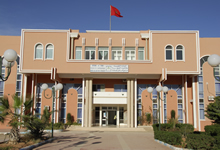

 The health sector, alongside the other sectors, plays a role of paramount importance in social development thanks to the services it provides as regards comprehensive health care. In fact, infrastructure in Sahrawi provinces witnesses a noticeable progress on account of the efforts exerted by the state in this connection.
The health sector, alongside the other sectors, plays a role of paramount importance in social development thanks to the services it provides as regards comprehensive health care. In fact, infrastructure in Sahrawi provinces witnesses a noticeable progress on account of the efforts exerted by the state in this connection.
The health care policy implemented in Sahrawi provinces since 1976 is materialized in the numerous achievements accomplished by the state as well as in the quality of health services provided by the created facilities and in the improving health conditions of the population.
Pending the creation and functioning of new facilities, the efforts of health authorities centred then on fighting child diseases and malnutrition, which is held responsible for child death, in addition to other diseases which were widespread in the region, such as eye diseases, gastroenteritis and tuberculosis.
Also, medical delegations were dispatched to the region to provide basic medical care and give advice to the population about hygiene, food, and prevention.
The health policy followed in the southern provinces aims at:
-
Ensuring the region's self-sufficiency in view of its remoteness from the major heath centres.
-
Making health services available for the largest possible number of citizens and for free, and accommodating them to the specific needs of the region according to a geographic distribution of facilities;
-
Developing curative and preventive medicine, in line with the relevant national policy.
Southern provinces today have a modern decentralized hospital system that allows to meet the population's needs. The goals sought have been achieved at three levels, namely:
-
establishing appropriate health infrastructures;
-
training executives who can fulfil the region's needs;
-
organizing prevention campaigns.
At the regional level, the hospital constitutes the ultimate stage in the health care process, since there is a network of clinics and health centres which provide basic treatment and diagnosis operations in districts.
The huge progress in the infrastructure of southern provinces can be seen in the creation of health care services, both in urban and rural areas. In towns, attention has been particularly given to populous districts which were deprived of all health care facilities.
The region of Laayoune-Boujdour Saquia Lhamra has three provincial hospitals, one of which is military, in addition to 17 health centres and two private hospitals. As for the region's medical presence, there are 69 doctors (52 public doctors and 17 private doctors) for about 175.669 inhabitants, that is one doctor for every 2546 inhabitants. The region has 405 beds, that is one bed for every 434 inhabitants, whereas at the national level there is one physician for every 2860 inhabitants and one bed for every 1010 inhabitants. According to these figures, the region is equipped in terms of health facilities in comparison with the national medical density.
On account of the number of the population of Laayoune-Port (140.998), medical density remains far from fulfilling the increasing needs of a constantly growing population, especially as these cities are attractive and have an influence on the neighbouring areas for their economic weight, particularly in the commercial field, which is remarkable throughout the Sahrawi region.
As for the province of Smara, the public sector offers one hospital, four clinics and one health centre, offering a total of 67 beds. The number of doctors is as follows: 3 specialist physicians, 19 general practitioner and 57 nurses.
The private health sector in this province is composed of 3 doctor's surgeries, 5 medical treatment units, 4 pharmacies and 3 pharmaceutical warehouses.
The province thus has about one doctor for every 2630 inhabitants.